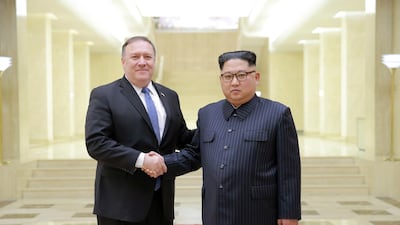By scrapping the Iran nuclear deal and agreeing to meet North Korean leader Kim Jong-un in Singapore on June 12, US President Donald Trump is confronting the same basic question: does Washington have the will or ability to prevent another spate of international nuclear weapons proliferation?
In the 1960s and 1970s, a wave of proliferation took place among rising powers like China, Israel and India. However, in the 1980s and 1990s, except for Pakistan, which was catching up with India, the process stopped. Countries that might have gone nuclear like Indonesia, Brazil and Argentina pulled back while South Africa, Ukraine and Kazakhstan abandoned their arsenals.
However, in October 2006, North Korea conducted its first nuclear test and in 2016 tested a warhead and, apparently, a hydrogen device. Iran was probably about a year away from acquiring its own nuclear weapon when it agreed to postpone or mothball its programme in return for sanctions relief under the nuclear deal.
With Iran and North Korea, Mr Trump has adopted two radically different approaches to the same proliferation conundrum.
Right now, there aren’t many non-nuclear powers pursuing their own weapons. But these two rogue regimes wanted them for the same purposes: to increase their regional clout and impunity and to guard against any externally imposed regime change. Both obviously noted that two other so-called rogue regimes that abandoned their special weapons programmes, Saddam Hussein’s Iraq and Muammar Gaddafi’s Libya, no longer exist.
Washington has led concerted international campaigns of sanctions and maximum pressure, intended to force Tehran and Pyongyang to abandon these plans. But efforts to coerce North Korea have failed utterly.
Iran was willing to voluntarily accept the 10-to-15 year delays in the nuclear deal, partly because it wanted to focus on developing much more advanced, domestically produced centrifuges than those it already had. That way, any future charge towards a nuclear breakout would get much further and go significantly faster. Tehran needed time anyway and under the nuclear deal, when its restrictions expire, Iran would be no more than four months from breakout.
For the West, too, the Iran deal was essentially a chronological gamble, hoping Iranian policies, politics or ambitions would change during the period of pause. After all, arms control treaties are political instruments that are strictly enforced – until they're not. Iran's voluntary enrichment restrictions could have been extended after – or collapsed before – they expired on paper.
____________________________
Read more from Opinion:
Expo 2020 Dubai will help strengthen our warm friendship with China - Reem Al Hashimy
Trump's nuclear decision should not hinder a greater vision for the Arab region - Raghida Dergham
____________________________
Leaving the Iran deal, Mr Trump is hoping that sanctions, combined with other focused, coercive measures, can produce what amounts to regime change in Tehran. That is wildly implausible. There’s virtually no historical precedent for sanctions producing externally driven regime change anywhere and no evidence that there’s a revolutionary situation brewing inside Iran with merely a shove needed to bring the regime down.
The far greater likelihood is that hardliners will be strengthened, at least inside Iran. A concerted anti-Iranian campaign on many fronts might produce a welcome rollback of Iranian hegemony in the Arab world. But it’s hard to imagine the president who so carefully avoided all Russian, Iranian and Hezbollah targets during the recent Syrian missile strike and wants to pull all US troops out of Syria immediately leading such a campaign.
Even if he did and even if it was successful in rolling back Iranian hegemony, the most likely result is a more hardline regime in Tehran and a mad dash towards nuclear weapons. Tehran obviously wants to do as much business with Europe as it can and try to isolate Washington, which it can’t. So the deal might briefly survive but in a zombie-like living death. When it completely collapses, Iran will rush towards nuclear weapons, just as North Korea did.
That appears to have greatly profited Pyongyang. Mr Kim is now referred to by Mr Trump as "very honourable" and "excellent" and is meeting the American president as an equal, merely in exchange for three hostages.
A cold reading of current reality suggests Iran made a big mistake in postponing its programme while North Korea was wise to charge towards hydrogen bombs and intercontinental missiles. That’s a terrible incentive structure.
The most Mr Trump is likely to get from Mr Kim won't be the mothballing and delays Iran accepted but, along with many false pledges, perhaps a real commitment not to build a missile capable of delivering a nuclear warhead to the continental US. But that won't stop regional proliferation with Japan and possibly South Korea eventually moving in the nuclear direction. When Iran revives its nuclear programme, neighbours like Saudi Arabia will, as it has said, need to follow suit.
Regime change isn’t a realistic goal. It requires actions on the scale of the Iraq invasion of 2003. Nothing less ever works. That’s almost impossible to imagine in Iran and even more implausible in North Korea.
Mr Trump is flinging honey at North Korea and vinegar at Iran in pursuit of the same non-proliferation goal. In both cases, there's no sign of any practical plan B, other than old-fashioned containment. Proliferation might ultimately prove unavoidable, unless Mr Trump is ready for some very big wars. Even if he is, the American people certainly aren't.
Hussein Ibish is a senior resident scholar at the Arab Gulf States Institute in Washington DC


